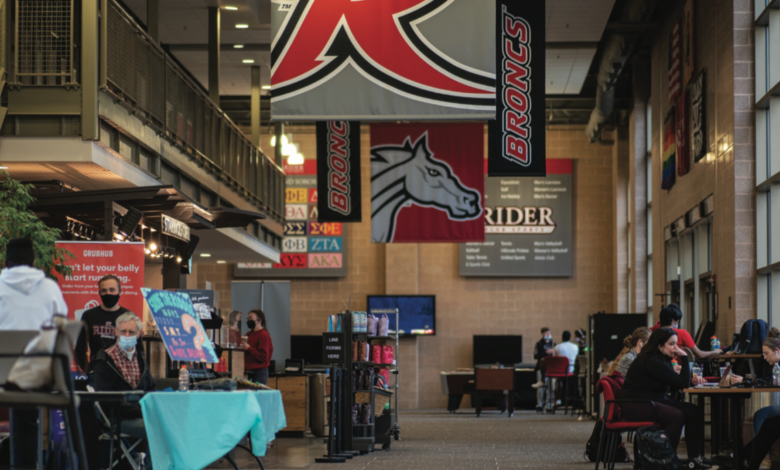
Student wages stay behind NJ’s minimum wage
By Sarah Siock
The first week of the spring semester, Rider senior Preston Hicks realized his class schedule was less hectic than he was used to and thought the best way to make use of his spare time was to get an on-campus job. Hicks opened Handshake, the website where the university lists campus jobs, but he was quickly disappointed. He was shocked to find several student jobs starting at rates lower than New Jersey’s minimum wage of $13 an hour.
As Hicks was scrolling through the listings, he questioned if it was worth his time to work on campus.
“Thankfully for me it’s not that big of a deal because I’m pretty lucky with a decent scholarship from Rider, and I’ve got another job off-campus. I was just looking for something extra I could do. I realized it was pretty messed up for someone who needs to be able to work on-campus to fund their education,” said Hicks, a computer science major.
Hicks decided to sign-up for the student worker pool, a group of student workers who are on standby to provide additional work support to any departments on campus. Handshake lists the estimated salary for this job at $11.70 per hour.
“I’m lucky that I can afford to take a job just for the convenience, that pays less than it really should be paying. For other students, you’d have to juggle both a job on campus, along with some other job. You would have to be working crazy hours in order to make that work pay off your education and living expenses,” said Hicks.
Minimum wage regulations
Hicks is not alone in taking a student job for less than the state’s minimum wage. Legally, colleges and universities in New Jersey are exempt from having to pay the full minimum wage to student workers if the compensation paid is at a minimum of 85% of the state minimum wage. Currently, Rider starts level one student workers, those seeking entry-level jobs with no previous work experience, at $11.70 an hour or 90% of the minimum wage.
Another limitation student workers face is that they cannot work more than 20 hours a week. The student employment handbook states the reasoning behind hours limitations is so students can “prioritize” and “maintain” their academic performance.
“We choose to pay 90% and take advantage of that 10% saving. By having that little bit of savings, we can provide more student employment opportunities,” said Kim Barberich, executive director of the Career Development and Success Office at Rider.
In 2019, Gov. Phil Murphy signed a law that gradually increases the state’s minimum wage to $15 an hour. Since its enactment, the state minimum wage has increased by $1 each year on Jan. 1. The starting student wage at Rider also has increased since the law was passed but at 90 cents each year instead of $1.
In comparison to neighboring New Jersey universities, Rider is not an outlier. According to their websites, The College of New Jersey’s (TCNJ) level one student workers make $12 an hour and Rowan University’s level one workers start at $11.05. Meanwhile, Princeton University differs from the norm
and starts its on-campus jobs at $13 an hour.
Convenience on campus
“There are benefits that you get from working on campus… really being part of the community, feeling like you are contributing to the running of a university, and building those connections that are oftentimes mentorships. There’s also a lot of flexibility with hours. We always tell supervisors that the student schedules are the priority,” said Barberich.
For some students, the convenience of working on campus outweighs the pay cut. Senior elementary education major Josie Abruzzi has had three on-campus jobs throughout her time at Rider. At all of Abruzzi’s jobs, she earned less than $13 an hour.
“It’s just easier with the hours and classes. I feel like the supervisors are just really understanding of the fact that we are in school. So with that, it’s definitely just much more convenient for sure,” said Abruzzi.
During Abruzzi’s junior year she worked as an embedded tutor for a freshman writing class. Abruzzi said she was responsible for keeping up with readings and the class’s homework, holding weekly group sessions and attending the class at least once a week, amounting to eight to 12 hours of work a week. Abruzzi said her compensation did not equate to the effort she put into the job.
“It was kind of a lot. … I guess I just got used to working more than what I was being paid for,” said Abruzzi.
However, Barberich and Rider’s student employment coordinator Liz Pastor said students have the opportunity to discuss issues about their pay at the Career Development and Success Office.
“If a student feels like they’re doing work that they’re not getting paid for. They have every opportunity to address that with us. And we would definitely make the changes. Students come first in this office,” said Barberich.
A push to increase minimum wage
Nationally there has been an increase in corporations raising their starting wages, such as Target, CVS and Amazon all starting at $15 an hour. Rider does offer raises to student workers, which is a 5 cent increase for every year an employee stays with the same department. However, Eve Sylvester, a sophomore exercise science major and office assistant in Wright Resident Hall, said she wished Rider’s pay was more comparable to off-campus jobs.
“You don’t have to have a job. I think it’s people who are more ambitious that get one, and maybe they should be a little more rewarded for getting a job and being a student. It shows that you’re putting in as much work as you can,” said Sylvester.


